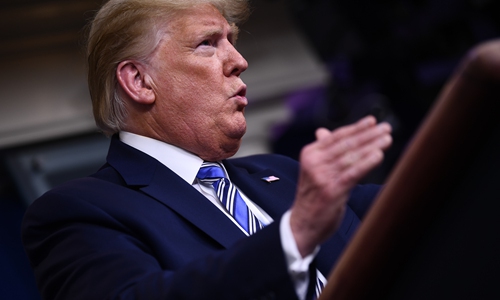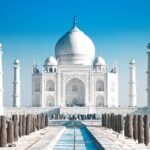While the anti-racism protests continue to spread in the US, polls for the 2020 presidential election has cast a shadow on President Donald Trump as he trails his presumptive opponent former vice president Joe Biden in more than 40 national polls.
Based on the results, some Chinese experts predict a defeat for Trump, but others noted that uncertainty still exists, given Trump’s base and his vigorous reactions to the worsening street violence, which may win him more support later from people affected by the violence.
Biden led in every single one of those more than 40 national polls in May, and “Biden’s never been behind in any of these polls since at least January 2019… His average lead in a monthly average of polls has never dipped below 4 points and has usually been above it,” a CNN analysis on May 31 said.
The report said Biden is the first challenger to be ahead of the incumbent in every May poll since Jimmy Carter in 1976.
The ongoing US unrests plus the Trump administration’s failure to cope with COVID-19 epidemic will certainly be a blow to Trump, but the impact of the fallout from these crises on the election remains to be seen, experts noted.
The damage caused by the rioters to buildings and businesses has interrupted the country’s economic resumption plan, and the great economic loss from the coronavirus outbreak would worsen if the unrest continues, which is bad news for Trump, because a thriving economy has always been his political asset, said Sun Chenghao, assistant research fellow at the Institute of American Studies of the China Institutes of Contemporary International Relations.
Sun told the Global Times on Tuesday that it is true that Trump’s failure to solve the long-standing racial tensions has given his opponent Biden, the presumptive Democratic presidential nominee, a great opportunity to demonstrate his ability to address such racial conflicts, as the latter is believed to deal with the issue in a softer and more inspiring way.
While Trump repeatedly called for harsh measures against protesters, Biden’s reaction is the opposite.
After criticizing Trump for stoking racism, he visited a protest site on Monday in Delaware and talked to the protesters there. He promised on social media that he would lead the conversation in the confrontation and listen to people’s appeals if he wins.
Minority voters were not in Trump’s camp in the 2016 election, nor would they be this time, especially when his opponent has a special place in the black community after serving as the VP of the first black president in the US, experts noted.
But Xin Qiang, deputy director of the Center for American Studies at Fudan University in Shanghai, doubts if the poll results would turn into votes, especially in swing states.
Trump supporters have an extremely high recognition of him, who may remain silent in the polls but are in favor of Trump deep inside, Xin told the Global Times.
Some Americans may have sympathized with the death of the black man. But if the unrest intensifies and their personal interests are infected, they may lose patience, which could give Trump an opportunity as Trump advocates tougher actions against protesters, Xin noted.
Following the rapid spread of the Minnesota riots across the US, the risk of social disturbance will stimulate the “silent majority” of American voters to choose the leader who represents order, and prompt white and Asian voters to resist the anti-racial discrimination movement, Mei Xinyu, a research fellow at the Ministry of Commerce’s Chinese Academy of International Trade and Economic Cooperation, said.
Asian people prefer an ordered and stable society, analysts noted.
If Trump and his team dress him up as a symbol of order and “equal opportunity,” demonstrating his decisiveness, boldness and ability to act quickly to quell the riots, the riots could then turn into an advantage for Trump, Mei said.
The election result remains uncertain as polls were generally wrong in the 2016 election, believing Hillary Clinton would definitely win, analysts said.
US President Donald Trump File Photo: AFP



